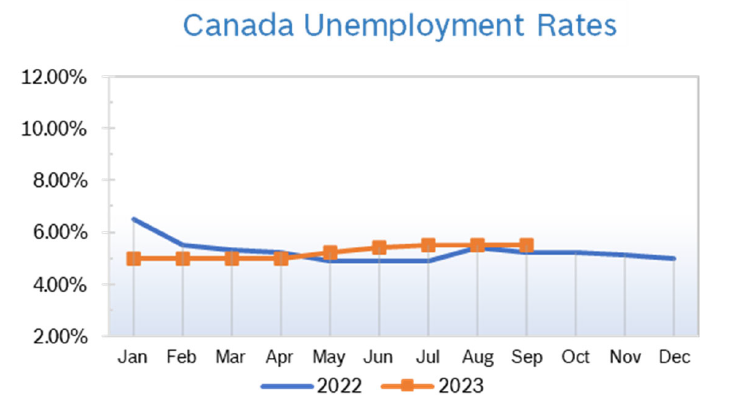|
Unemployment Remains at 5.5%
Consumer Prices Rise 4.0% Consumer prices were up 4.0% year over year in August after being up 3.3% year over year in July. The increase was larger than expected and driven by gasoline prices, which surged in recent months after oil-production cuts by Saudi Arabia and Russia. Shelter costs jumped for both renters and homeowners facing higher mortgage payments. Core inflation metrics rose as well, which could give the BoC reason to raise rates again. Housing and Construction News Canadian housing starts fell 1% in August to 252,787 units from a revised 255,232 units in July, according to Canadian Mortgage and Housing Corporation (CMHC). Economists had expected starts to fall even more. The decrease came as the rate of urban housing starts fell 1% to 233,075 units in August. The pace of multi-unit urban starts fell 1% to 191,250, while the rate of single-detached urban starts rose 2% to 41,825. The six-month moving average of the overall monthly seasonally adjusted annual rate of housing starts was 244,507 units in August, up 0.8% from 242,552 in July. Canadian home sales fell 4.1% in August after falling 0.7% in July but were up 5.3% from August 2022, according to the Canadian Real Estate Association (CREA). The national average home price rose 6.3% to $668,754. Analysts described the market as stabilizing. GDP Contracts in Q2, Unchanged in July GDP contracted 0.2% in Q2 due to softening household spending, a reduction in housing investment and slower exports. GDP rose 0.6% in the first quarter. Increased business investment in engineering structures and higher government spending were among the few components that contributed to growth. GDP was mostly unchanged in July, with services-producing industries gained 0.1%, while goods-producing industries contracted 0.3%. Manufacturing fell 1.5%. Early estimates for August show GDP rising 0.1%. Interest Rates Steady at 5% The Bank of Canada’s (BoC) decision in early September to hold interest rates steady at 5% was greeted with relief by Canadians. The bank stated it was too early to think about a rate cut and held the door open to future interest rate hikes if inflation rose or other conditions dictated. Canadian Premier Justin Trudeau expects interest rates to begin to come down by mid-2024, in line with recent Reuters polls. A majority of economists, 24 of 34, polled during the last week of August expect the BoC to keep its policy rate at the current level of 5% or higher until at least the end of March 2024. The median shows economists expect 50 basis points worth of cuts by the end of June next year, in line with expectations for the US Federal Reserve. Retail Sales Retail sales rose 0.3% in July to $66.1 billion after rising to $65.9 billion in June. Sales increased in seven of nine subsectors. Core retail sales, which exclude gasoline stations, fuel vendors and motor vehicle and parts dealers, rose 1.3% in July after falling 0.9% in June. In volume terms, retail sales edged down 0.2% in July for the second consecutive month. Retail sales increased in five provinces, led by British Columbia and Quebec. Retail Ecommerce Sales Retail ecommerce sales were up 2.4% in July to $4.0 billion, accounting for 6.0% of total retail trade, compared with 5.9% in June. © Robert Bosch Tool Corporation. All rights reserved, no copying or reproducing is permitted without prior written approval.
Comments are closed.
|
Archives
July 2024
|








